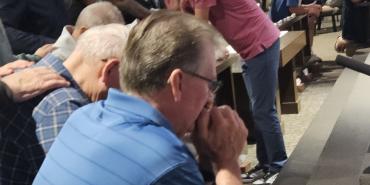Something Old, Something New

It was introduced rather quietly and it could have been very easily ignored. For that reason, I'd like to bring it to your attention.
As our committee moved to a unanimous adoption of the resolution, there was a palpable sense that we all desired our church to wrestle with this challenge. This was the motion offered by Jim Couchenour Sr.:
'We the USA/Canada Mission/Evangelism (UCME) Committee of the General Board of the Church of the Nazarene, believing that expressing the compassion of Jesus in practical ways to the marginalized of our society is central to the gospel and integral to the making of disciples, do hereby ask UCME to begin discussion with appropriate bodies to help us find ways to encourage all our people and churches in USA/Canada to embark on ministries of practical compassion to the poor, widows, orphans, addicted, imprisoned, immigrants, or otherwise marginalized in their communities as God directs. We believe that taking the fragrance of Jesus through deeds of mercy to persons in need will ease their pain, deepen our discipleship, and bring glory to our Lord.'
Compassionate ministry and social justice is certainly not new to the Church of the Nazarene and yet I believe that we are standing on the edge of what is perhaps a more comprehensive engagement. The desire to improve spiritual and physical suffering was expressed in our earliest days as a denomination.
I am sure many of you have memories like mine: a grandmother who not only invited families to church but walked the hills of West Virginia taking homemade soup to the sick and prayers to those who would allow them. While themes of social justice have become popular in our larger society, from its beginning the Church of the Nazarene felt compelled to reach around the globe in ministry, in medical care, in teaching, and in service.
Work and Witness teams have brought people together in world areas building not only churches, schools, and housing, but also bridges of knowledge between groups. Compassionate Ministries in the Church of the Nazarene has developed a far-reaching, incredibly effective network for responding to need wherever it may be found.
So what is new about social justice? Perhaps what might be changing is our perception of our own possibilities to participate in the work. As a church, we have enjoyed a deep sense of community in local churches and districts. Perhaps we are in the midst of experiencing a broadening of that vision of community and a widening of our sense of responsibility.
Why now? Why should the emphasis on social justice engage us so personally?
In the field of family therapy, families are considered to be systems. Changes in one member of the family seem to inevitably bring about changes in other members, for better or for worse. This is also a helpful way to think of our wider human family.
We are inextricably linked in the air we all breathe, in the ways our actions in the environment can create repercussions for those far away, in the ways we utilize resources that are not limitless, and in the ways we are willing to share out of our abundance with those in need. No longer can we leave these responsibilities up to a few.
Concern for compassionate ministry and social justice is calling to us all.
How we choose to live affects others around the world. How we choose to give can also impact lives around the world and our responses are core, not peripheral, acts of discipleship. These issues call to us all. Why?
We are members of the human family in a world that is getting increasingly smaller each day. Our actions impact others and we can choose to be a healing force in the world, easing pain wherever we can. This is not only for their sake, but for our growth as well.
As we seek guidance in understanding how we can be God's hands and feet to his children, we will also grow in our own relationship with the Lord. As we translate the response that was born in the very beginning of our church into the new demands of our world today, God will indeed be glorified and His name will be praised.
In my local church, we close our Sunday service with these words: 'And now, oh God, send us out to do the work you have given us to do, to love and serve you as faithful witnesses of Christ our Lord.'
Jan Lanham is professor of psychology at Eastern Nazarene College in Quincy, Massachusetts and Eastern Region lay representative to the General Board of the Church of the Nazarene.
Holiness Today, November/December 2007
Please note: This article was originally published in 2007. All facts, figures, and titles were accurate to the best of our knowledge at that time but may have since changed.




